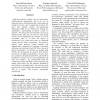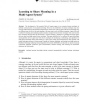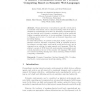971 search results - page 78 / 195 » Common Sense from the Web |
EMNLP
2010
13 years 5 months ago
2010
We introduce tiered clustering, a mixture model capable of accounting for varying degrees of shared (context-independent) feature structure, and demonstrate its applicability to i...
WCRE
2008
IEEE
14 years 2 months ago
2008
IEEE
High-level software artifacts, such as requirements, domain-specific requirements, and so on, are an important source of information that is often neglected during the reverse- an...
WISE
2008
Springer
14 years 2 months ago
2008
Springer
Abstract. Whilst Web services can be composed by technical developers using a language such as BPEL, there is no easy way for non-technical end users to take advantage of these ser...
AGENTS
2001
Springer
14 years 7 days ago
2001
Springer
The development of the semantic Web will require agents to use common domain ontologies to facilitate communication of conceptual knowledge. However, the proliferation of domain on...
NLDB
2004
Springer
14 years 1 months ago
2004
Springer
Human interaction occurs always in a specific context and in a particular environment, and a common knowledge base about them is essential for understanding each other. By immersi...



